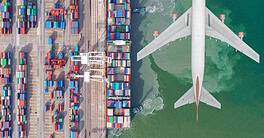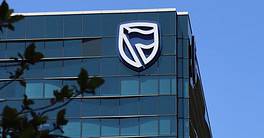Global Finance names this year’s best trade finance providers in the world.

Global trade has been rocked by seismic changes to supply chains and subdued economic outputs over the course of the Covid pandemic; but increased innovation and digitalization of trade finance has ensured that businesses can still operate and provide a more sustainable future with greater transparency, which bodes well for a new trade finance ecosystem.
Trade finance is playing an increasingly crucial role in supporting companies’ efforts in meeting environmental, social and governance (ESG) targets and opportunities, be it from paperless processes or green financing; and these are being enabled by the digital efforts of both banks and technology companies.
According to the Asian Development Bank (ADB) the global trade finance gap hit an all-time high of $1.7 trillion due to Covid—with small and midsize enterprises (SMEs), hardest hit, accounting for 40% of rejected trade finance requests. ADB highlights the role of digitalization in streamlining onboarding processes for SMEs and opening new sources of liquidity. Digital innovation can make the entire trade ecosystem more efficient, more inclusive and less costly. The pandemic has brought additional urgency to the need to solve the hurdles hindering fragile supply chains and the financing of trade.
For banks, digitalization offers a reduction in operating costs and more accurate records of transactions, which can be used to provide trade insights. It also provides more reliable and instant know your customer (KYC) and anti-money laundering (AML) checks, which can cut compliance costs.
Using artificial intelligence (AI) to interpret scanned documents and check them against a set of predefined rules and regulations allows banks to focus on the anomalies highlighted by AI, rather than spend their time on labor-intensive reading of documents manually and other repetitive tasks that take up much of their time. Benefits are not limited to banks. All parties across trade transactions benefit from reduced costs, greater fraud mitigation and the optimization of working capital.
The use of optical character recognition (OCR), machine learning and neural language processing significantly lowers errors in trade-related documentation, while the consolidation of digital trade documentation into a single electronic file brings further efficiencies to the multiple parties in various jurisdictions, including trading partners, financial institutions, credit insurers, shipping companies, customs and other services providers.
The digital ledger of transactions created on a blockchain, provides trade participants with all the necessary trade information in one digital document. Blockchain also creates the means to perform sustainability screening and verification, which could help scale up the delivery of green trade finance and sustainability-linked trade finance deals such as the one announced between HSBC and clothing company Epic Group, which ties pricing to ESG targets, including greenhouse gas emissions and freshwater use intensity.
While the world was forced to close borders and become more insular, interoperability between players and platforms has offered a way forward for all participants in trade finance, where cooperation promises a more inclusive and less fragmented approach to trade.
Last year, the World Bank said that to fully reap the benefits of new technologies, the entire trade ecosystem—banks, regulators, border agencies, trade bodies and corporates—must work together to apply digital innovation and drive efficiencies. This collaborative approach will help drive the future of trade finance and help meet substantiality objectives.
Methodology: Behind the Rankings
Global Finance editors select the winners for both the Trade Finance Awards and the Supply Chain Finance Awards with input from industry analysts, corporate executives and technology experts. The editors also consider entries submitted by financial services providers, as well as independent research, taking into account a set of objective and subjective factors. This year’s ratings, which cover 102 countries and eight regions, were based on performance during the period from the fourth quarter of 2020 through the third quarter of 2021.
It is not necessary to enter in order to win, but experience shows that the additional information supplied in an entry can increase the chance of success. In many cases, entrants are able to present details and insights that may not be readily available to the editors of Global Finance.
The winners are those banks and providers that best serve the specialized needs of corporations as they engage in cross-border trade. The winners are not always the biggest institutions, but rather the best: those with qualities that companies should consider most carefully when choosing a provider. Global Finance uses a proprietary algorithm with criteria—such as knowledge of local conditions and customer needs, financial strength and safety, strategic relationships and governance, competitive pricing, capital investment and innovation in products and services—weighted for relative importance. Each entity is rated on each separate criterion. The algorithm incorporates those ratings into a single numeric score, with 100 equivalent to perfection. In cases where more than one institution earns the same score, we favor local providers over global institutions and privately-owned over government-owned institutions.
|
GLOBAL WINNERS |
|---|
BEST TRADE FINANCE PROVIDER—BANK
BNP Paribas
Great breadth and depth in trade finance services and solutions helped BNP Paribas win this year’s Global Best Trade Finance Provider–Bank award. With a market-leading position in Europe and strong presence in the Asia-Pacific region and the Americas, BNP Paribas has over 350 trade finance experts, working in 100 trade centers to assist clients with their trade finance operations.
Investment in innovation to improve the global trade process features strongly in the French bank’s digital transformation as it seeks to empower clients in their own digitalization efforts. “The mission of BNP Paribas is to accompany its clients in their trade projects, notably on centralization,” remarks Jean-Francois Denis, head of Trade Solutions and Network Management at BNP Paribas.
Recent innovations include Connexis Guarantees, to enhance the issuance and reporting capabilities of business guarantees. Connexis LC Export offers a full digital overview of the lifecycle status of export letters of credit (LC). Optical character recognition (OCR), combined with machine learning and natural language processing technologies, meanwhile, are being deployed by BNP Paribas to digitize paper documents and automatically extract data.
BEST TRADE FINANCE PROVIDER—NON-BANK
Finastra
By integrating Fusion Trade Innovation with Enigio’s trace:original solution, Finastra, our Best Trade Finance Provider–Non-Bank, created an app solution for managing and handling digital original documents using distributed ledger technology—removing the need for a central registry or document repository. The solution allows banks to generate traceable documents. This could, according to both companies, offer an 82% reduction in tasks requiring manual intervention, saving up to an estimated 91% in processing and management costs. It can also cut processing time for a single document from 14 days to a few hours.
MOST INNOVATIVE BANK FOR TRADE FINANCE
Shinhan Bank
South Korea’s Shinhan Bank was chosen as the Most Innovative Bank for Trade Finance, owing to its ongoing efforts to use digitalization to simplify trade finance. Internally, various trade finance documents are automated using robotic process automation and Shinhan is applying artificial intelligence (AI) for the screening of documents to ensure they meet evolving global sanction compliance. Shinhan also takes an active role in consortiums and pilot projects using assorted technologies and is constantly looking to strengthen its efforts to provide digital trade finance solutions.
BEST TRADE DOCUMENT MANAGEMENT
Standard Chartered
Having already issued the world’s first renminbi-denominated blockchain LC on Contour—a blockchain-based trade platform—Standard Chartered Hong Kong was chosen by a leading steel manufacturer to provide the first back-to-back LC structure and electronic document presentation with essDOCS combination, also on Contour, in 2021 to win the Best Trade Document Management award.
BEST USE OF ARTIFICIAL INTELLIGENCE IN TRADE FINANCE
Sberbank
Sberbank’s AI strategy continues to streamline laborious processes and bring benefits to clients. The bank won the Best Use of Artificial Intelligence in Trade Finance award for creating an online evaluation system that recommends the best trade finance offers to clients. If the system finds that a client and counterparty need an LC, the client is instantly invited to fill out the form.
BEST PROVIDER OF SUSTAINABLE FINANCE SOLUTIONS IN TRADE FINANCE
GeTS Asia
The Best Provider of Sustainable Finance Solutions in Trade Finance, GeTS (Global eTrade Services) Asia designed Green Trade Navigator—a platform to calculate the carbon footprint of trading activities in the supply chain—with trade data supplied by a feed from CALISTA (the company’s single platform, designed to address the compliance, logistics and financial requirements of global trade).
By calculating the carbon footprint contained in the greenhouse gas emissions associated with each transaction, traders can use a green score to generate green trade reports and apply for invoice financing by assessing sustainability. Green Trade Navigator also provides autosuggestions as to what part of a trader’s trading activity can become more sustainable.
BEST TRADE FINANCE SOFTWARE PROVIDER
CGI
The Best Trade Finance Software Provider, CGI made recent back-office enhancements to CGI Trade360, using application programming interfaces to help clients and drive trade and supply chain finance innovation. These include straight-through processing for payables financing; incorporation of an eSignature solution into trade finance workflows; integration of intelligent process automation into the platform; integration with a digital document platform; leveraging of blockchain technology; and new sustainable supply chain finance and sustainability-linked loan product offerings.
BEST DLT PLATFORM FOR TRADE FINANCE
we.trade
Distributed ledger’s ability to provide consensus among participants in trade transactions is making it easier for buyers and sellers to trade globally with greater reliability. We awarded Best DLT Platform for Trade Finance to we.trade, which commercially launched in 2019 as the world’s first enterprise-grade, blockchain-enabled trade finance platform—connecting buyers, sellers, banks and logistics companies in a network that simplifies cross-border trading. With over 1,700 live transactions, more than 400 SME and corporate clients and 95% business financing, supporting clients via bank payment undertaking (BPU) and BPU financing, we.trade is currently licensed by 16 banks across 15 countries.
BEST BANK FOR EXPORT FINANCE
Ahli United Bank
The Best Bank for Export Finance award went to Ahli United Bank for supporting approximately 25% of the total exports in the Kingdom of Bahrain to the tune of $1.35 billion worth of export LCs, which is even more impressive when you consider that Bahrain is a net importer.
BEST BANK FOR TRADE FINANCE IN EMERGING MARKETS
VTB Bank
Russia’s VTB Bank, our Best Bank for Trade Finance in Emerging Markets, increased support for both Russian exports and trade financing operations for clients in the countries of the Commonwealth of Independent States. To help meet the increased demand in export financing solutions from companies in emerging markets, VTB executed over 500 transactions with counterparties from over 45 countries in 2021.
BEST BANK FOR TRADE FINANCE IN FRONTIER MARKETS
TDB
The Best Bank for Trade Finance in Frontier Markets award went to the Eastern and Southern African Trade and Development Bank (TDB), set up to serve frontier economies–16 out of TDB’s 22 member states are considered among the least-developed countries and the rest are mostly considered as lower-middle income. By tying finance activities to ESG policies and systems, TDB secured the sourcing of strategic commodities such as essential inputs for agriculture, leading to higher productivity levels and food security. TBD boosted high-value exports and export diversification; safeguarded energy security by mitigating grave fuel shortages; supported industrialization, technology transfer and infrastructure through the import of equipment; creating over a million jobs over time; shoring up the capacity of regional and national financial institutions to support their client base; and facilitating greater intra- and inter-African trade and regional integration—thereby advancing the region’s socioeconomic progress.
|
REGIONAL WINNERS |
|---|
AFRICA
Societe Generale
Societe Generale, which is present in 19 African countries, won the regional crown for its continued support of trade finance in Africa. A cooperation agreement with Absa Group has increased client coverage across 27 countries, while a new Payment Division dedicated to Africa, a regional foreign exchange trading room, participation in the “China-Africa Corridor” and development of intra-African corridors all provide support and impetus to increasing trade. Societe Generale has also introduced several solutions to help digitalize trade finance documentation, such as automated document checking in the framework, the transformation of images into text thanks to OCR technology, and the classification of documents and automatic extraction of data using named-entity recognition and natural language processing.
ASIA-PACIFIC
Citi
Citi’s Asia-Pacific trade team serves local and multinational clients in 15 countries across the region. The bank has a strong suite of tailored products, including electronic trade loans, synthetic loans, receivables, distribution and sales finance provide funds; while enhanced data insight analytics provide added value throughout the transaction life cycle. Recent innovations include an exports dashboard in India, the digitalization of a highly manual process of cross-border trade import payments and reconciliation in the Philippines, a fully digitalized commercial drafts solution in China and the launch of a sustainable supply chain financing solution.
CARIBBEAN
Citi
Citi is present in 11 Central American and Caribbean locations and has expanded its trade digitalization capabilities to include a new electronic trade loans solution, supplier digital onboarding, offshore electronic receivables financing and a payment service agreement across the region.
CENTRAL & EASTERN EUROPE
UniCredit
UniCredit is a trade finance market leader in Central and Eastern Europe (CEE), and it’s one of the key banks for euro clearing—acting as a gateway for euro payments to anywhere in the world. Clearing capabilities for key CEE currencies make for faster and simpler procedures. As a pan-European bank, UniCredit provides local and international knowledge; while a varied selection of tools and services means it can extend comprehensive financial support to businesses of all sizes.
LATIN AMERICA
Citi
To complete a hat trick of regional wins, Citi increased its market share from 16% to 20% over the past four years in Latin America, where it is present in 21 countries. Recent innovations include the expanded use of DocuSign and the rollout of supplier digital onboarding to Brazil, Colombia, Peru, Costa Rica and Ecuador—also, digital bank guarantees, with real-time, electronic delivery to the beneficiary in Brazil, Colombia, Ecuador and Peru. Citi’s electronic trade loans solution is now live in 14 countries in Latin America, and Citi expanded its electronic discounting platform further into the receivables financing market to include currencies in Brazil and Peru.
MIDDLE EAST
Arab Bank
In the Middle East, Arab Bank’s wide network and regional accessibility provide corporations with opportunities to expand across geographies. Arab Bank’s trade finance offering facilitates commerce and trade between local importers and exporters, as well as multinational companies. The ArabiConnect trade portal provides corporates with digital self-service solutions and with real-time and forecast views of their liquidity.
NORTH AMERICA
BNY Mellon
BNY Mellon provides front-end, white-label trade finance systems in North America. As a member of the blockchain-based trade finance Marco Polo Network, BNY Mellon is working on a proof of concept for the use of AI in trade sanction filtering and is currently testing how AI and robotics can be harnessed to read various trade documents. BNY Mellon has also been increasing the speed and accuracy of its document management solutions and is using OCR technology with internal operations to improve efficiencies and to streamline transactions.
WESTERN EUROPE
BNP Paribas
In Western Europe, BNP Paribas has over 2,000 trade finance experts and provides online trade transaction solutions via Connexis Trade, Connexis Cash, Connexis Guarantee, Connexis LC Export, Connexis Supply Chain, SWIFTNet Trade for Corporates, Centric and the Contour blockchain network. BNP Paribas also provides sustainability linked loans, which involve a set of objectives, or key performance indicators.




